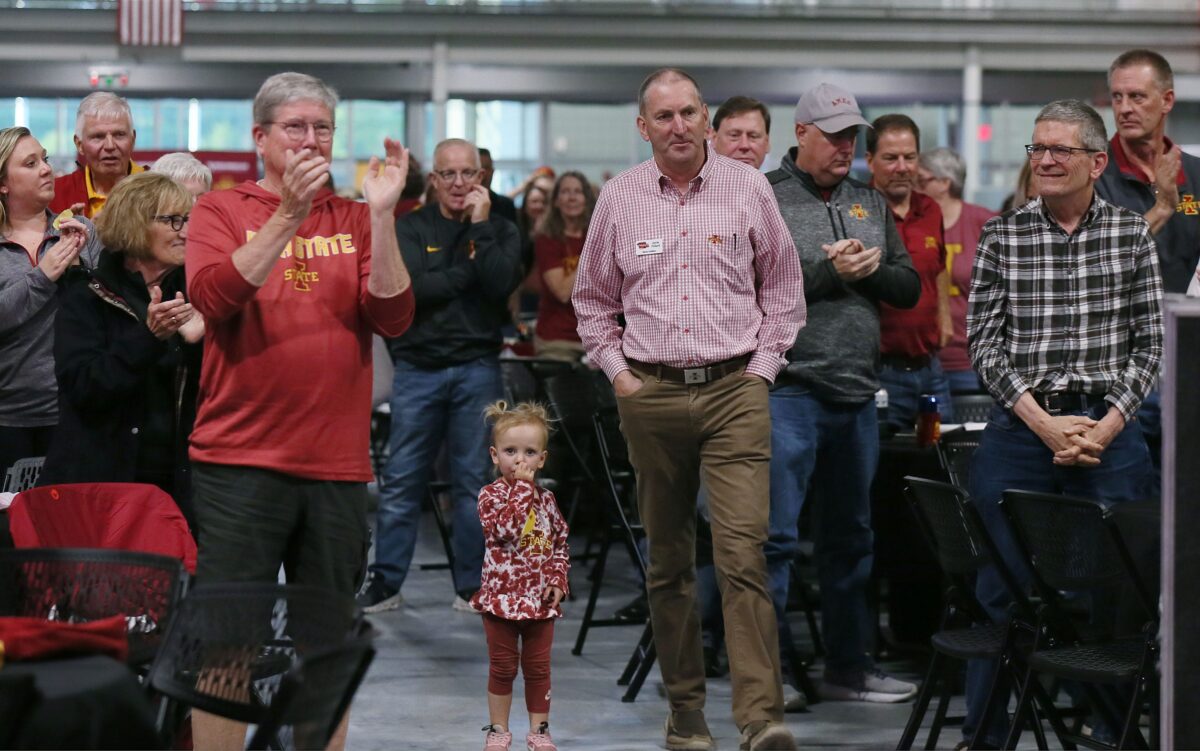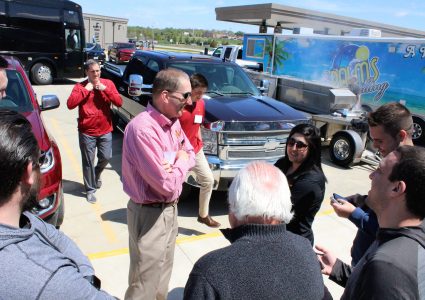Cyclones fans greet as Iowa State athletic director Jamie Pollard walks to the stage during Cyclones Tailgate Tour at MidAmerican Energy RecPlex on Thursday, May 9, 2024, in West Des Moines, Iowa. © Nirmalendu Majumdar/Ames Tribune / USA TODAY NETWORK
WEST DES MOINES — Kevin Dresser boasts a new knee and a fresh spring in his step.
So Iowa State’s head wrestling coach was understandably buoyant as he helped kick off the Cyclones’ 18th annual Tailgate Tour Thursday evening at the MidAmerican Energy Company RecPlex. Dresser’s program is coming off a fourth-place finish at the NCAA Championships — its best finish since 2010 — and all the coaches accompanying him on the two-week trip across the state have their respective programs on marked upswings, as well.
“(ISU director of athletics) Jamie (Pollard) sends out emails all the time to let us know where we stand,” Dresser said. “That shows you he might be a little bit competitive and I think we’re standing in a better place than we’ve ever stood before. I think we’re in the top 20 or top 25 (collectively), which is tremendous.”
The full array of Cyclone athletics programs ranked 17th, to be precise, in the winter Learfield Directors’ Cup standings, which measures success across all sports. So optimism reigns supreme as ISU coaches such as Dresser, Matt Campbell (football), Bill Fennelly (women’s basketball), Christy Johnson-Lynch (volleyball), and T.J. Otzelberger (men’s basketball) join Pollard in barnstorming the state. But that optimism is flanked by deep uncertainty as the college sports landscape shifts and sways from courtrooms to boardrooms.
“We’re all hypothesizing about how we’re going to deal with this,” said Pollard, who expects methods for paying student-athletes — from NIL to potential revenue-sharing schemes — to continue to evolve rapidly. “But we’ll figure it out. We always do and we’ll continue to, you know, move forward.”
Sometimes that means scaling back. Pollard said plans for a new wrestling facility have been put on hold as his department braces for more changes.
“There’s just no way possible to go forward and convince the state that we can take bonds out to pay for a wrestling facility when the College Football Playoff decided to take all the money and give it to the Big Ten and the SEC,” Pollard said. “And with this (NIL anti-trust) lawsuit (against the NCAA) getting ready to be settled, you just can’t go forward with projects like that. That’s the same reason we didn’t go forward with (renovations) at Hilton (Coliseum. You just can’t bond for them.”
Dresser said he understands Pollard’s predicament.
“There (are) a lot of challenges in college athletics right now financially,” Dresser said. “So I’m sure Jamie is pumping the brakes on a lot of things right now just because you don’t know what’s gonna hit you with these players getting paid in the future and how these conferences are gonna shake out and who’s gonna get what and who’s not gonna get what.”
Pollard said some of the challenges the industry faces “could be insurmountable,” but he expects college athletics to survive in an altered state. He also said ISU has navigated the NIL world well with relatively limited resources, so potential financial shortfalls that loom ahead — which could be significant — can be dealt with properly.
“One of the things that excites me about the new world is I think we’ve been kind of operating in that world already,” Pollard said. “And there (are) others that have just operated willy-nilly, and now they are gonna even make their problems even worse. And we’ve already kind of established a culture that — you can’t argue about the success.”
Not when the Cyclones are enjoying their highest winter Learfield Directors’ Cup ranking ever and not when football could be ranked in the preseason top 25, men’s basketball will likely be top five, and women’s basketball should be ranked very highly, as well.
So high expectations meet high anxiety for ISU, but it’s far from alone in the latter regard. Money doesn’t solve every problem either, even as the Big Ten and SEC are slated to receive the lion’s share of the College Football Playoff money (29% each), with the ACC (17%) and Big 12 (15%) far behind.
“You just have to look at the evolution,” Pollard said. “It isn’t the SEC and Big Ten. It’s those that have all the gold (who) make all the rules, right? So if I was a member of the Big Ten or SEC, I’d start looking over my shoulder and wondering if, when’s the day gonna come when the top of the SEC is not gonna want the bottom of the SEC? I mean, go back and look at times when the AFL and the NFL merged, they only needed one commissioner. And when the ABA and the NBA merged, they only needed one commissioner. There’s gonna come a day (when) they don’t need two 6 million dollar-a-year commissioners and they’re gonna eat their own. And if we think that’s not gonna happen, you’re a fool because we didn’t think the Pac-12 would get eaten and it did. The CFP is just another example of our industry running amok and they’re trying to swallow the ACC and the Big 12 and I wish them all the best because they’re gonna eat their own.”





